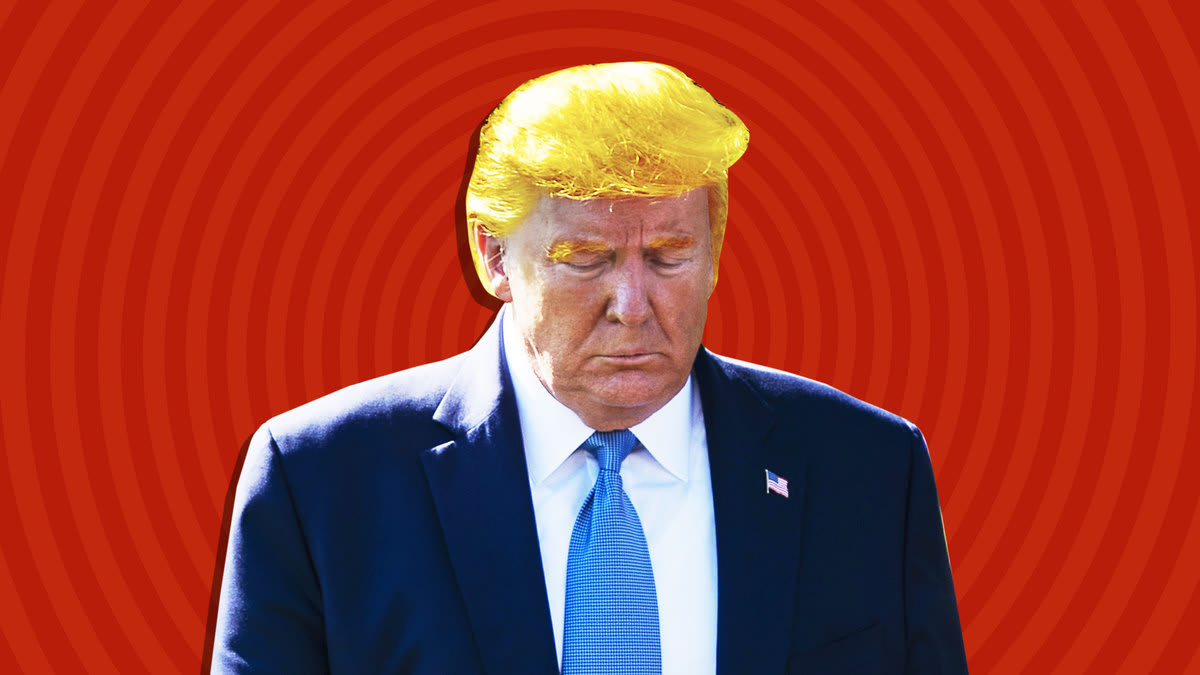The Anti-Shakedown Law That Could Finally Bring Down Trump
When voters hear “no president is above the law,” many want the law in question to be more like something out of a police procedural than a constitutional law seminar.

OPINION
Photo Illustration by The Daily Beast/Getty
Matthew Whitaker—remember him? Whitaker is a minor footnote in the sordid history of the Trump administration, an unqualified toady who served as acting attorney general for three months before a heavyweight hack—Bill Barr—took over. But on Tuesday, Whitaker went on Fox News with the essence of Trump’s lame new defense: “Abuse of power is not a crime.”
Trump brown-nosers have already exhausted other, more plausible excuses for the president’s conduct. Ambassador William Taylor’s smoking howitzer testimony obliterated the “no quid pro quo” defense the president and his defenders have been peddling since the Ukraine scandal broke. Taylor’s careful timeline established beyond the shadow of a doubt that Trump abused his power as president. Instead of contesting that conclusion, the White House is now moving to a defense arguing that Trump’s behavior might have been “inappropriate” or even wrong, but what he did wasn't illegal and therefore does not rise to the level of impeachment.
This will change the nature of the trial of Donald John Trump in the U.S. Senate, Chief Justice John Roberts presiding. Instead of arguing the facts, the president’s lawyers and Senate defenders will more likely take a page from the Democrats in William Jefferson Clinton’s 1999 impeachment trial and argue that the president’s mistakes in judgment don’t merit removal from office. They will ignore the obvious distinction between Clinton lying about sex and Trump personifying corruption and will almost certainly create a constitutional crisis by adding an Article 2 claim that the inherent powers of the president allow him to, essentially, do whatever the hell he wants with the executive branch.
The answer to the GOP’s furious and—because they’re pros at it—dangerous counterattack lies in federal law. It’s time that Democrats and Republicans and independents of conscience add a new word to the debate, the “E-word”—Extortion.
In her cogent and persuasive fact sheet, House Speaker Nancy Pelosi streamlined the evidence so far (pre-Taylor) and sorted it into three handy categories that show Trump violated his oath of office: “The Shakedown,” “The Pressure Campaign,” and “The Cover-Up.”
Pelosi wants to keep the House’s indictment on a high constitutional plane. So she doesn’t explain that shakedowns, pressure campaigns and cover-ups are all illegal under federal law. The first two constitute extortion and the third is obstruction of justice. Defining them as such isn’t necessary for either impeachment or removal. The House managers who will serve as prosecutors in the Senate trial are under no obligation to prove that a statute was violated.
But the court of public opinion is a different venue, and it requires a different set of arguments for the wait-and-see voters who haven’t been paying close attention. When they hear “no president is above the law,” many want the law in question to be more like something out of a movie or TV police procedural than a constitutional law seminar. The law that says that maybe—depending on one’s constitutional interpretation— the White House has to cough up documents is less convincing than one that says you can’t act like Don Vito Corleone.
I’m a native of Chicago, which has more than its share of public corruption cases. Federal charges often involve payoffs and kick-backs—bribing someone to do something. Extortion more often involves threats (shakedowns, pressure campaigns) related to the consequences of not doing something. Think “I’m gonna make him an offer he can’t refuse” or “I’d like you to do us a favor, though.”
The relevant law is the 1946 Hobbs Act, which was passed to curb labor union racketeering. Courts have since ruled that this federal statute applies strongly to public officials acting “under color of law”—meaning in their official capacities—and that it is not even necessary to prove intentionality in the quid pro quo, though with Trump there is plenty of that, or that the quid pro quo was completed. In other words, the fact that the military aid was finally sent to Ukraine is irrelevant to whether Trump is guilty of extortion.
Trump’s shakedown had potential consequences much bigger than whether a studio boss wakes up with a horse’s head in his bed. As Taylor explained in his deposition, the $400 million in military aid that Trump used as his political weapon was essential to protecting Ukraine from Russians who had already killed 13,000 Ukrainians. Left undefended, Ukraine could easily slip into Russia’s orbit, a terrible fate for the Ukrainian people and a geopolitical nightmare that would essentially mean the resurrection of the old Soviet empire. Trump’s motive was not to get Johnny Fontaine a part in a movie but to corrupt an American presidential election by whacking Joe Biden.
The case for Trump’s removal from office is so strong that some argue the solemnity of this constitutional crisis should not be reduced by impeaching the president in part for acting like a two-bit criminal. And including the Hobbs Act in articles of impeachment, they say, might risk letting Trump’s defense attorneys distract the proceedings with hair-splitting arguments about the intent of an obscure 1946 law when the House doesn’t need extortion to impeach and the Senate doesn’t need it to remove. On the other hand, introducing prima facie evidence of law-breaking might throw Republican lawyers and lackeys off their Article 2 game and rebut their argument that the president committed no crime.
Either way, the Hobbs Act should be an important part of the public debate. By the Sunday shows, expect the Trump bootlickers —their tongues in perfect alignment—to all be chanting the same talking point:

No comments:
Post a Comment